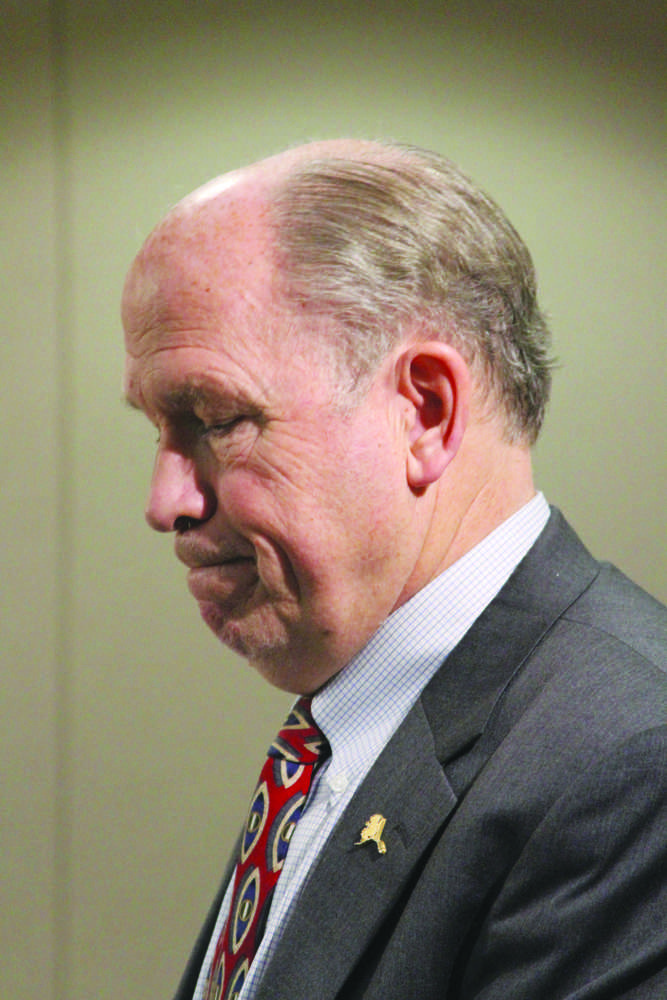JUNEAU — Gov. Bill Walker announced hiring and travel restrictions for state workers on Tuesday, the same day an agency lowered Alaska’s credit rating because of continued low oil prices.
The hiring and travel restrictions for departments in the executive branch come two weeks before the start of the legislative session, when lawmakers are expected to consider ways to address the estimated $3.5 billion deficit.
Walker has proposed a sweeping plan that includes putting oil tax revenue into the Alaska Permanent Fund and using money generated from the fund to provide a stream of cash to pay for state government. It would change how the annual dividend that most Alaskans receive is calculated. Walker also is proposing increases in industry taxes, changes to the state’s oil tax credit system and reinstituting a personal income tax to further close the deficit to about $427 million for the next fiscal year.
Some Republican legislative leaders have said they would like to see deeper cuts, while some Democrats have said they are concerned about the effect of the plan on working-class Alaskans. Walker has said he tried to be fair in making his proposals.
Exceptions to the hiring restrictions include positions deemed essential to protect life, health and safety, including the Alaska State Troopers, corrections officers and those providing resident and patient care at 24-hour institutions like the pioneer homes.
During a news conference with Walker on Tuesday, Department of Administration Commissioner Sheldon Fisher said many departments already have taken steps to restrict travel and hiring and that Walker’s order provides consistency in guidance. Walker could not say how much money would be saved by implementing the restrictions.
In a news release announcing the changes, Walker said it’s critical that state employees “continue to take every step possible to ensure we are being good stewards of our resources.”
Travel deemed non-essential, such as going to trade association conferences, will be restricted. Travel plans made before Tuesday should be canceled unless substantial additional costs would result beyond the standard cancellation fee, according to a memo from Walker chief of staff Jim Whitaker to the commissioners of state departments affected by the governor’s order. Each commissioner must approve travel, and out-of-state travel plans must be approved by Whitaker or his designee.
Instead of travel, Walker is encouraging state employees to use video- and telephone conferencing instead, and his office says he has asked boards, commissions and non-executive state agencies, including the university system, to follow suit.
The University of Alaska system has had travel restrictions for about a year that are in line with what Walker has laid out, system spokeswoman Roberta Graham said. It will follow the same restrictions as laid out by Walker for general hiring and look for additional cost efficiencies, she said.
Also on Tuesday, Standard & Poor’s Ratings Services lowered Alaska’s credit rating, citing continued low oil prices that have exacerbated the state’s budget deficit. The agency lowered Alaska’s rating on general obligation debt from AAA to AA-plus, and the agency listed as negative its outlook on all debt ratings.
Walker, in a statement, called the action “concerning and premature” because the Legislature, which convenes later this month, hasn’t had time to act on a long-term fiscal plan. But he said it further shows an immediate need to address the budget.
The downgrade isn’t major but shows a trend, Walker said during the news conference in Anchorage. “We’re moving down a trail we don’t want to be going down,” he said.
The agency said the credit rating could erode further if legislators do not enact “significant fiscal reforms” to address the deficit this year. “In our view, Alaska has sufficient financial resources to stabilize general fund operations if it can assemble the necessary political will to adopt the necessary changes,” the agency said in a report released Tuesday.
Sen. Anna MacKinnon, R-Eagle River, and co-chair of the Senate Finance Committee, said she was disappointed by the agency’s action. Once session starts, her committee will work toward balancing the budget, she said.

